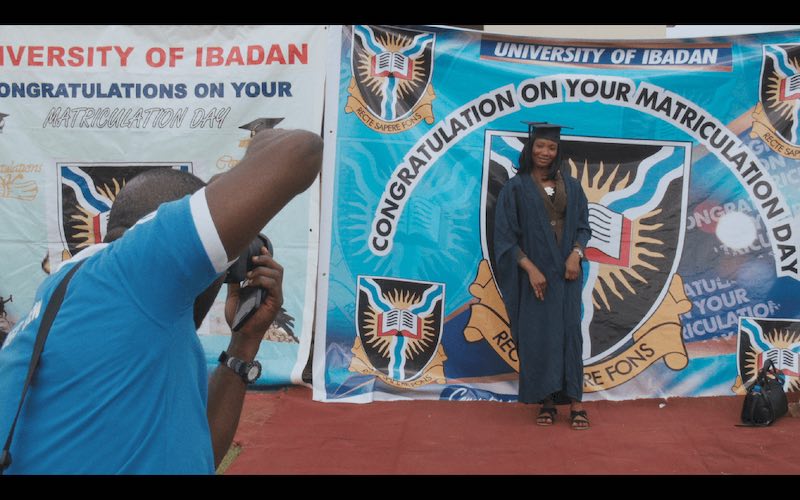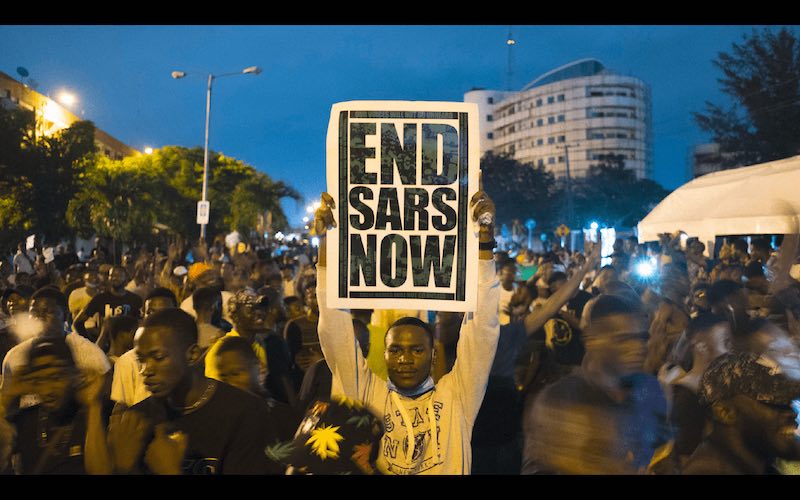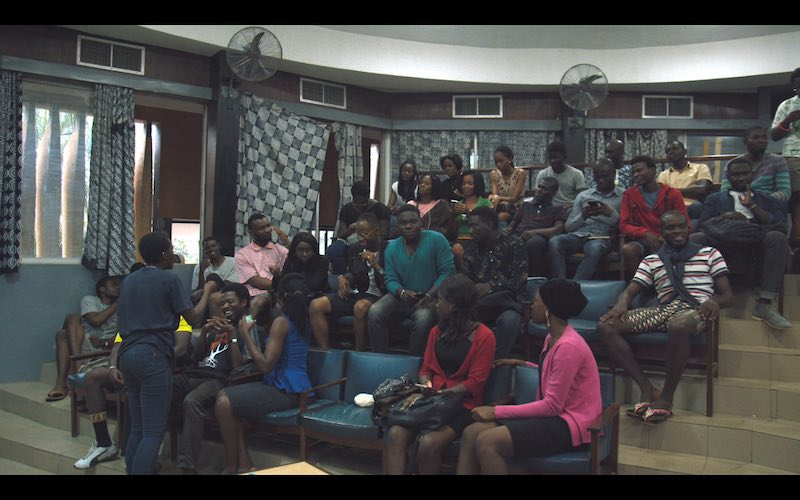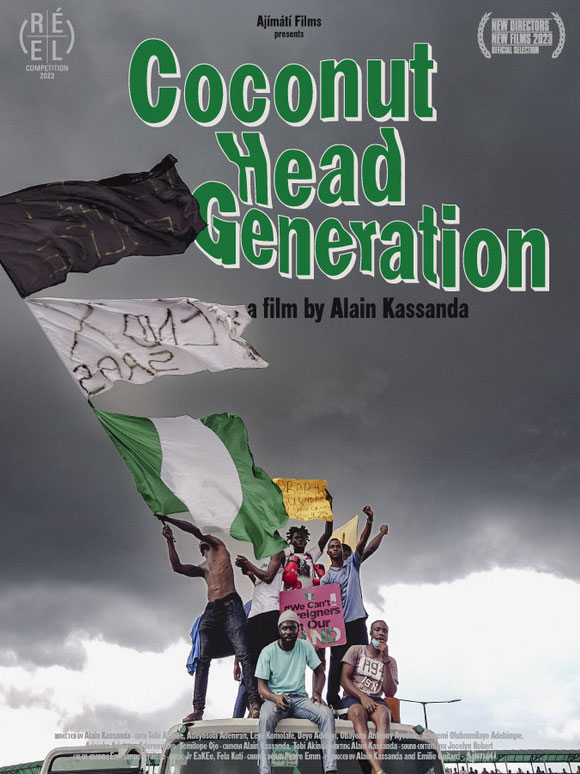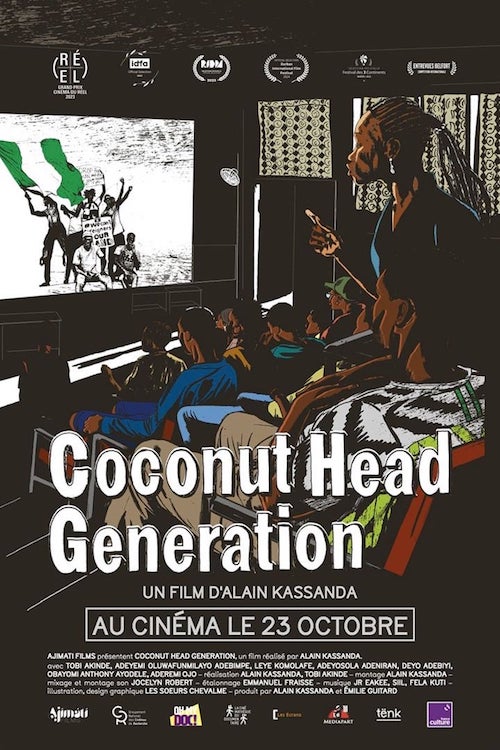Coconut Head Generation
-
Réalisé par Alain Kassanda • Écrit par Alain Kassanda
-
France, Nigeria • 2023 • 89 minutes • Couleur
- Réalisation :
Alain Kassanda - Écriture :
Alain Kassanda - Image :
Alain Kassanda, Tobi Akinde - Son :
Alain Kassanda - Montage :
Alain Kassanda - Musique originale :
Jr EaKEe
- Production (personne) :
Alain Kassanda - Production (structure) :
Ajímátí Films - Ayant droit :
Ajímátí Films
- N° ISAN :
non renseigné
Résumé
Tous les jeudis un groupe d'étudiants de l'université d'Ibadan, la plus ancienne du Nigeria, organise un ciné-club, transformant un petit amphithéâtre en une agora politique où s'affine le regard et s'élabore une parole critique.
"Tous les jeudis soirs, l'Université d'Ibadan, grande ville du sud-ouest du Nigeria, abrite un ciné-club. Un lieu safe, où les étudiants et les étudiantes visionnent des films qu'ils prennent le temps de discuter. Dans ce ciné-club sont projetés des films pour parler intersectionnalité, décolonisation, luttes féministes, luttes LGBT, minorités ethniques du pays, droits des étudiants ou élections. Un lieu pour permettre à ces jeunes gens qu'on associe à la "Coconut Head Generation" d'affronter le monde et la société nigériane. Cette expression méprisante qui qualifie la jeunesse de paresseuse et abrutie, les étudiants se l'approprient en la détournant afin d'en faire une force et de revendiquer leur intelligence critique. Au gré des séances, de débats houleux en discours éloquents, les étudiants apprennent à se situer, à marquer leurs différences et à penser ensemble. La salle de cinéma devient un lieu d'éducation autogéré où l'on apprend à lutter et à s'organiser. D'abord très intérieur – l'université, la salle de cinéma –, le film s'ouvre quand le réel rattrape le cinéaste et les étudiants au travail. Alain Kassanda suit les révoltes étudiantes d'octobre 2020 qui éclatent contre les violences policières et les abus de la Special Anti-Robbery Squad, une unité de police anti-vol (#EndSARS). Alors que les étudiants regardent des films de Med Hondo, de Mahamat Saleh Haroun ou de John Akomfrah, ils deviennent les personnages d'un film de lutte. Le film les regarde s'ouvrir au réel et devenir les acteurs et les actrices d'un changement. Face au monde qui se transforme trop lentement, face à son histoire et ses violences, teacher, don't teach me nonsense."
(Clémence Arrivé - Cinéma du réel)
Every Thursday, a group of students from the University of Ibadan, the oldest in Nigeria, organizes a film club, transforming a small amphitheater into a political agora where they refine their vision and develop a critical voice. Coconut Head Generation, a scornful expression to designate a stubborn and brainless youth, takes on a whole new meaning when the students turn this stigma around to claim their freedom of thought.
"Every Thursday night, at the university of Ibadan, a big city in south-western Nigeria, a film club provides a safe place where students come to watch films which they also take the time to discuss. The film club features works that touch on intersectionality, decolonization, feminist struggles, LGBT struggles, ethnic minorities, student rights and elections, thereby providing the so-called "Coconut Head Generation" with a space from which they can grapple with Nigerian society and the world at large. The disparaging expression, which casts the youth as lazy and obtuse, is claimed back and repurposed by the students who recast it as a strength and affirm their critical minds. From one screening to the next, amid heated discussions and impassioned speeches, the students learn to position themselves, to assert their differences and to think together. The cinema becomes a space for self-governed education where members learn to fight and organize. The first scenes of the film take place indoors, at the university or at the cinema, but the horizon broadens when reality catches up with the filmmaker and the students. Alain Kassanda follows the student uprising against police violence and the abuse committed by the Special Anti-Robbery Squad (#EndSARS) which flared up in October 2020. At the time that the students are watching the films of Med Hondo, Mahamat Saleh Haroun and John Akomfrah, they become the protagonists of an activist film, which captures their growing awareness of reality and their transformation into actors of change. Confronted with a world where change moves too slowly, with its history and its violence, they cry out: teacher, don't teach me nonsense."
(Clémence Arrivé - Cinéma du réel)
Mot(s)-clé(s) thématique(s)
Sélections et distinctions
- 2024 • Images en bibliothèques • Paris (France) • Film soutenu par la Commission nationale de sélection des médiathèques
- 2024 • États généraux du film documentaire • Lussas (France) • Séminaire "Histoires de programmation"
- 2023 • IDFA - International Documentary Festival Amsterdam • Amsterdam (Pays-Bas) • Best of Fests
- 2023 • Cinéma du réel • Paris (France) • Grand Prix & Mention spéciale du jury du Prix Clarens du Documentaire Humaniste
- 2023 • Festival Cinémas d'Afrique • Lausanne (Suisse) • Panorama
- 2023 • Escales Documentaires • La Rochelle (France) • Mention spéciale
- 2023 • EntreVues - Festival du film de Belfort • Belfort (France) • Prix d’Aide à la Distribution Ciné +
- 2023 • RIDM - Rencontres Internationales du Documentaire de Montréal • Montréal (Canada) • Panorama - Horizons
- 2023 • Traces de Vies • Clermont-Ferrand (France) • Compétition Regard documentaire Hors Frontières
Comment avoir accès au film ?
- Sortie en salle
-
Édition DVD
- Il n'existe pas d'édition DVD à notre connaissance
-
Accès VOD
- Il n'existe pas d'accès en VOD à notre connaissance
- Distribution
- Aide sur les moyens d'accéder à un film
